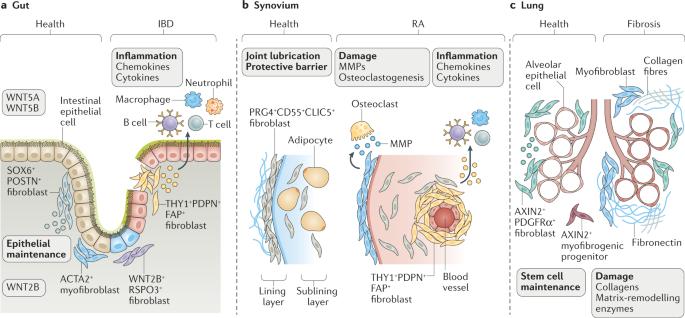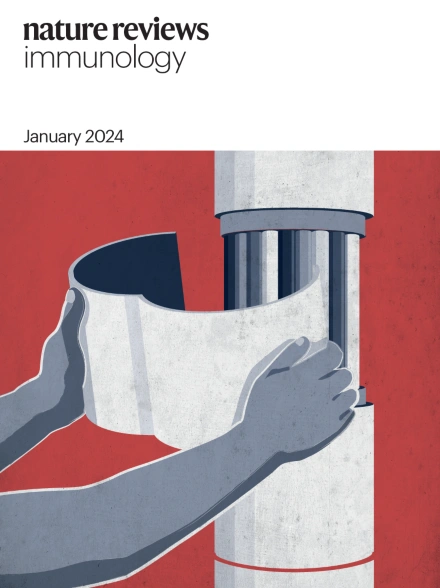Fibroblasts as immune regulators in infection, inflammation and cancer
IF 67.7
1区 医学
Q1 IMMUNOLOGY
引用次数: 158
Abstract
In chronic infection, inflammation and cancer, the tissue microenvironment controls how local immune cells behave, with tissue-resident fibroblasts emerging as a key cell type in regulating activation or suppression of an immune response. Fibroblasts are heterogeneous cells, encompassing functionally distinct populations, the phenotypes of which differ according to their tissue of origin and type of inciting disease. Their immunological properties are also diverse, ranging from the maintenance of a potent inflammatory environment in chronic inflammation to promoting immunosuppression in malignancy, and encapsulating and incarcerating infectious agents within tissues. In this Review, we compare the mechanisms by which fibroblasts control local immune responses, as well as the factors regulating their inflammatory and suppressive profiles, in different tissues and pathological settings. This cross-disease perspective highlights the importance of tissue context in determining fibroblast–immune cell interactions, as well as potential therapeutic avenues to exploit this knowledge for the benefit of patients with chronic infection, inflammation and cancer. Fibroblasts are not just crucial structural cells; they exist as multiple functionally diverse populations, defined by their location and context, and regulate tissue immunity. Here, the authors review the immunological properties of fibroblasts, comprising both pro-inflammatory and immunosuppressive activities, in different tissues and disease states.

成纤维细胞是感染、炎症和癌症中的免疫调节剂
在慢性感染、炎症和癌症中,组织微环境控制着局部免疫细胞的行为,其中组织驻留的成纤维细胞是调节免疫反应激活或抑制的关键细胞类型。成纤维细胞是一种异质性细胞,包含功能各异的群体,其表型因其来源组织和诱发疾病的类型而异。成纤维细胞的免疫学特性也多种多样,从在慢性炎症中维持强大的炎症环境,到在恶性肿瘤中促进免疫抑制,以及在组织内包裹和囚禁感染性病原体。在本综述中,我们将比较成纤维细胞在不同组织和病理环境中控制局部免疫反应的机制,以及调节其炎症和抑制特征的因素。这种跨疾病的视角强调了组织环境在决定成纤维细胞-免疫细胞相互作用中的重要性,以及利用这些知识造福慢性感染、炎症和癌症患者的潜在治疗途径。成纤维细胞不仅是重要的结构细胞,它们还作为多种功能的群体存在,由其位置和环境决定,并调节组织免疫。在此,作者回顾了成纤维细胞在不同组织和疾病状态下的免疫学特性,包括促炎和免疫抑制活性。
本文章由计算机程序翻译,如有差异,请以英文原文为准。
求助全文
约1分钟内获得全文
求助全文
来源期刊

Nature Reviews Immunology
医学-免疫学
CiteScore
93.40
自引率
0.40%
发文量
131
审稿时长
6-12 weeks
期刊介绍:
Nature Reviews Immunology is a journal that provides comprehensive coverage of all areas of immunology, including fundamental mechanisms and applied aspects. It has two international standard serial numbers (ISSN): 1474-1733 for print and 1474-1741 for online. In addition to review articles, the journal also features recent developments and new primary papers in the field, as well as reflections on influential people, papers, and events in the development of immunology. The subjects covered by Nature Reviews Immunology include allergy and asthma, autoimmunity, antigen processing and presentation, apoptosis and cell death, chemokines and chemokine receptors, cytokines and cytokine receptors, development and function of cells of the immune system, haematopoiesis, infection and immunity, immunotherapy, innate immunity, mucosal immunology and the microbiota, regulation of the immune response, signalling in the immune system, transplantation, tumour immunology and immunotherapy, and vaccine development.
 求助内容:
求助内容: 应助结果提醒方式:
应助结果提醒方式:


